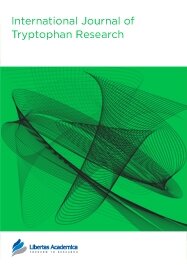

Publication Date: 10 Jun 2010
Type: Original Research - Special Issue
Journal: International Journal of Tryptophan Research
Citation: International Journal of Tryptophan Research 2010:3 91-97
doi: 10.4137/IJTR.S3971

Indoleamine 2,3-dioxygenase (IDO) catalyzes the initial and rate-limiting step of tryptophan catabolism in a specific pathway, resulting in a series of extracellular messengers collectively known as kynurenines. IDO has been recognized as an authentic regulator of immunity not only in mammalian pregnancy, but also in infection, autoimmunity, inflammation, allergy, transplantation, and neoplasia. Its suppressive effects are mostly mediated by dendritic cells (DCs) and involve tryptophan deprivation and/or production of kynurenines, which act on IDO-negative DCs as well as CD4+ and CD8+ T cells. We have found that mouse IDO contains two tyrosine residues within two distinct putative immunoreceptor tyrosine-based inhibitory motifs, VPY115 CEL and LLY253EGV. We have also found that Suppressor of Cytokine Signaling 3 (SOCS3)—known to interact with phosphotyrosine-containing peptides and be selectively induced by interleukin 6 (IL-6)—binds mouse IDO, recruits the ECS (Elongin-Cullin-SOCS) E3 ligase, and targets the IDO/SOCS3 complex for proteasomal degradation. This event underlies the ability of IL-6 to convert otherwise tolerogenic, IDO-competent DCs into immunogenic cells. Thus onset of immunity in response to antigen within an early inflammatory context demands that IDO be degraded in tolerogenic DCs. These studies support the finding that IDO is regulated by proteasomal degradation in response to immunogenic and inflammatory stimuli.
PDF (754.78 KB PDF FORMAT)
RIS citation (ENDNOTE, REFERENCE MANAGER, PROCITE, REFWORKS)
BibTex citation (BIBDESK, LATEX)
XML
PMC HTML

This is my second publication in Int J Tryptophan Res and my experience on this occasion was as great and enjoyable as with my first paper immediately preceding this one. I commend the Editors and the Editorial Staff of this new and exciting journal for their professionalism and dedication to science and scientific publishing.
Facebook Google+ Twitter
Pinterest Tumblr YouTube